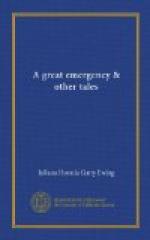Fred Johnson and I are very good friends, but since our barge voyage we have never been quite so intimate. I think the strongest tie between us was his splendid stories of the captain, and I do not believe in them now.
Oddly enough, my chief friend—of the whole lot—is Weston. Rupert always said I had a vulgar taste in the choice of friends, so it seems curious that of our old schoolmates Johnson should be his friend and Weston mine. For Johnson’s father is only a canal-carrier, and Weston is a fellow of good family.
He is so very clever! And I have such a habit of turning my pockets inside out for everybody to see, that I admire his reticence; and then, though he is so ironical with himself, as well as other people, he has very fine ideas and ambitions and very noble and upright principles—when you know him well.
“It’s an ill wind that blows nobody good,” and the fire that burned down our house got Weston into print at last.
It was not a common letter either, in the “correspondence” part, with small type, and the editor not responsible. It was a leading article, printed big, and it was about the fire and Rupert and Henrietta. Thomas Johnson read it to us, and we did not know who wrote it; but it was true, and in good taste. After the account of the fire came a quotation from Horace,
“Fortes creantur fortibus et bonis.”
And Johnson cried—“That’s Weston, depend upon it. He’s in the Weekly Spectator at last!”
And then, to my utter amazement, came such a chronicle of the valiant deeds of Rupert’s ancestors as Weston could only have got from one source. What had furnished his ready pen with matter for a comic ballad to punish my bragging had filled it also to do honour to Rupert and Henrietta’s real bravery, and down to what the colonel of my father’s regiment had said of him—it was all there.
Weston came to see me the other day at Dartmouth, where our training-ship Albion lies, and he was so charmed by the old town with its carved and gabled houses, and its luxuriant gardens rich with pale-blossomed laurels, which no frost dwarfs, and crimson fuchsias gnarled with age, and its hill-embosomed harbour, where the people of all grades and ages, and of both sexes, flit hither and thither in their boats as landlubbers would take an evening stroll—that I felt somewhat justified in the romantic love I have for the place.
And when we lay in one of the Albion’s boats, rocking up and down in that soothing swell which freshens the harbour’s mouth, Weston made me tell him all about the lion and the silver chain, and he called me a prig for saying so often that I did not believe in it now. I remember he said, “In this sleepy, damp, delightful Dartmouth, who but a prig could deny the truth of a poetical dream?”
He declared he could see the lion in a cave in the rock, and that the poor beast wanted a new sea-green ribbon.




